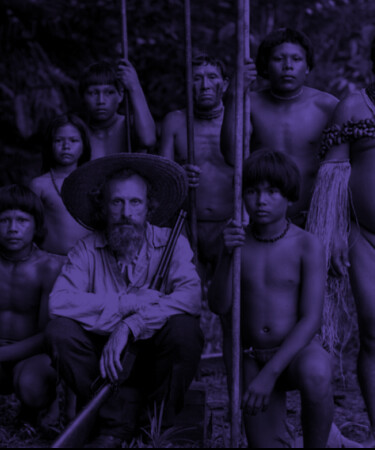
Filmwerkstatt Düsseldorf: Arbitrary blocking of Facebook pages endangers artistic freedom
In December 2021, Facebook deleted the page of Filmwerkstatt Düsseldorf. In March 2023, together with the law firm Hausfeld, we filed a lawsuit at the Regional Court of Düsseldorf
No warning, no explanation, no opportunity to defend oneself: When Facebook blocks or deletes users' pages or fan pages, it often happens arbitrarily. This was also the case with Filmwerkstatt Düsseldorf: In December 2021, the page of the non-profit association disappeared without warning. The presumed reason for the deletion was a program reference to the Oscar-nominated film "Embrace of the Serpent" that had been posted shortly before. The ad was accompanied by a film still showing the director and a group of traditionally dressed indigenous people.
SOCIAL MEDIA PLATFORMS ARE VITAL TO THE SURVIVAL OF ART
By arbitrarily deleting the page, Facebook is endangering the Filmwerkstatt's artistic freedom. This is because the Facebook page, which was followed by over 4000 people, was the main advertising channel for the non-profit association. With the arbitrary deletion of its Facebook page, the Filmwerkstatt is massively restricted in promoting its activities. It is difficult to quantify the damage that the association, which is financed in part by donations, has suffered as a result of its lack of presence.
For art in general, the Internet and social networks in particular are an indispensable platform for generating attention and thus making an impact. The fundamental right of artistic freedom, which was massively restricted by this arbitrary deletion, applies not only to private individuals, but also to non-profit associations.
BGH SETS HIGH HURDLES FOR BLOCKING PAGES
Social media platforms like Facebook usually moderate their content automatically using algorithms. However, the use of this artificial intelligence, which presumably also occurred in the case of the Filmwerkstatt, is very prone to error: filters strike at factors such as naked skin, for example, but without understanding the context of a work. This means that unlawful blockings and deletions are inevitable. The deletion of the page without warning or justification also makes it impossible for the Filmwerkstatt to defend itself against the measure. Attempts to contact Facebook went unanswered.
Facebook's actions clearly contradict the case law of the Federal Court of Justice (BGH) from 2021, which sets high hurdles for the blocking or deletion of users and pages: social networks such as Facebook must respect the fundamental rights of their users due to their enormous influence. The regulations include that account blocking must be objectively and factually justified. In addition, there must be a hearing beforehand and the possibility to question sanctions afterwards.
With the proceedings initiated together with the Filmwerkstatt, GFF wants to establish that the existing case law on freedom of expression can also be applied to artistic freedom. In the study " Fundamental Rights Obligations of Social Networks", published in March 2022, GFF lawyer and project coordinator Jürgen Bering has already shed light in detail on the extent to which social networks must protect the fundamental rights of their users.
FILMWERKSTATT DÜSSELDORF SHOWS PARALLELS TO GOLIATHWATCH
In July 2022, GFF together with the law firm Hausfeld already achieved a success. In February 2022, Facebook blocked the page of the anti-corporate NGO Goliathwatch - again without warning or announcement. In the urgent legal protection proceedings coordinated by us, the Hamburg Higher Regional Court ruled that the blocking was unlawful, so Facebook had to unblock the page. The court thus confirmed that non-users can also invoke the case law of the Federal Court of Justice in the event of a violation of freedom of expression. With the Filmwerkstatt case, there is now the possibility that a second court will confirm that Facebook must not only take into account the fundamental rights of private individuals, but also the fundamental rights of legal entities.



